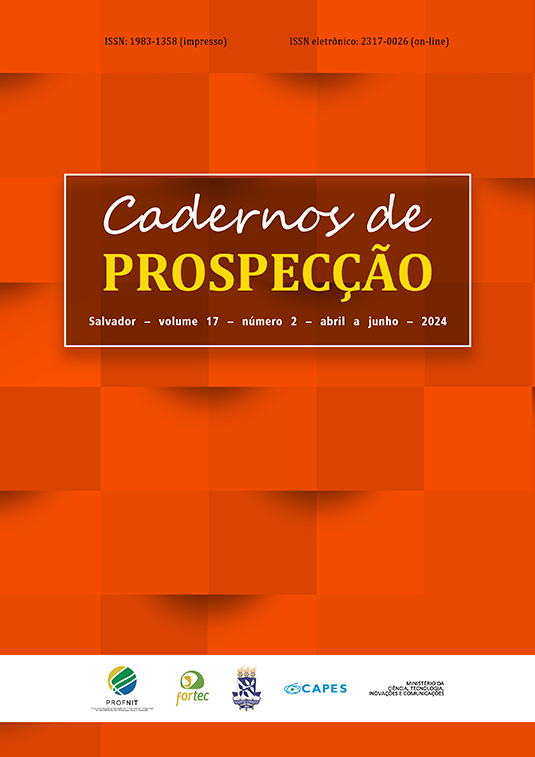Patents on Technologies Applied to Sports
DOI:
https://doi.org/10.9771/cp.v17i2.56530Keywords:
Patents, technologies, Sports.Abstract
Technology has played an increasingly important role in sports intelligence in recent years. From using sensors and wearable devices to monitor athletes' performance in real time to using advanced data and analytics to better understand the game, technology has changed the way sports are analyzed. The objective of this work is to present a mapping of patents regarding technologies applied in sport. To achieve this objective, patent prospecting was carried out on the Orbit Intelligence platform. The data indicate that in 2006 the first patent related to technology and sport was filed and demonstrate that the use of technological tools comes to contribute to improving the development of sport, scientific and technological knowledge, innovation and sports policies.
Downloads
References
ALMEIDA, M. A. B.; DE ROSE, D. Fenômeno esporte: relações com a qualidade de vida. In: VILARTA, R.; GUTIERREZ, G. L.; MONTEIRO, M. I. Qualidade de vida: evolução dos conceitos e práticas no século XXI. Campinas: IPES, 2010. p. 141-147.
BAZZO, W. A. Ciência, Tecnologia e Sociedade e o contexto da educação tecnológica. Florianópolis: UFSC, 2011.
BIANCHI, P.; HATJE, M. Mídia e esporte: os valores-notícia e suas repercussões na sociedade contemporânea. Motrivivência, Florianópolis, n. 27, p. 165-178, 2006.
CANALTECH. Tecidos tecnológicos garantem melhor desempenho aos atletas nas Olimpíadas. 2012. Disponível em http://corporate.canaltech.com.br/materia/olimpiadas/Tecidos-tecnologicosgarantem-melhor-desempenho-aos-atletas-nas-Olimpiadas-2012/. Acesso em: 23 jun. 2023.
CASTELLS, M. A sociedade em rede. 24. ed. São Paulo: Paz e Terra, 2013.
CBB – CONFEDERAÇÃO BRASILEIRA DE BASKETBALL. 2012. CBB Conta com Software que Observa Desempenho dos Atletas em Londres. 2012. Disponível em: http://www.cbb.com.br/PortalCBB/Noticias/Show/10131. Acesso em: 5 abr. 2013.
CHAGAS, M. E. De Chip a GPS, Tecnologias Devem Ajudar Árbitros e Técnicos de Correio Braziliense NÚMERO 21.966, demora nas patentes prejudica bioeconomia. 2023. Disponível em: https://edicao.correiobraziliense.com.br/correiobraziliense/2023/05/08/all.pdf. Acesso em: 18 ago. 2023.
FISHER, C. Sport Intelligence. In: STRUB, W.; WILLIAMS, J. (ed.). Cognitive Sport Psychology. Nova York: Lansing, 1984. p. 115-128.
GIL, A. C. Como elaborar projetos de pesquisa. 6. ed. São Paulo: Editora Atlas , 2017.
IPT – INSTITUTO DE PESQUISAS TECNOLÓGICAS DO ESTADO DE SÃO PAULO. A inserção das tecnologias digitais no esporte: manual de gerenciamento integrado. São Paulo: IPT/CEMPRE. 2005.
KENSKI, V. M. Aprendizagem mediada pela tecnologia. Revista Diálogo Educacional, [s.l.], v. 10, p. 47-56, 2003. Disponível em: http://www2.pucpr.br/reol/pb/index.php/dialogo?dd1=786&dd99=view&dd98=pb. Acesso em: 23 jun. 2023.
LIN LYION. As 10 melhores faculdades chinesas. [2023]. Disponível em: https://www.acupuntura-mtc.com/links_variados/10-melhores-universidades.php. Acesso em 19 ago. 2023.
OCDE – ORGANIZAÇÃO PARA A COOPERAÇÃO E DESENVOLVIMENTO ECONÔMICO. Manual de Oslo. 2005. Disponível em: http://www.finep.gov.br/images/a-finep/biblioteca/manual_de_oslo.pdf. Acesso em: 23 jun. 2023.
OLHARDIGITAL. A tecnologia diminuindo os erros de arbitragem. 2011. Disponível em: https://olhardigital.com.br/2022/11/22/reviews/inteligencia-artificial-copa-2022/. Acesso em: 18 maio 2023.
ORBIT INTELLIGENCE. Pesquisa. 2023. Disponível em: https://www.orbit.com/#PatentSearchHistoryPage. Acesso em: 23 jun. 2023.
SÁENZ, T.; GARCIA, E. C. Ciência, Inovação e Gestão Tecnológica. Brasília, DF: editora Senai Abipti, 2002. 136p.
SANTOS, B. F. O esporte mediado pelas tecnologias digitais: um novo ponto de vista a ser questionado com reflexões e perspectivas. Revista Brasileira do Esporte Coletivo, [s.l.], v. 3, n. 2, 2019.
SOARES, C. Educação Física: raízes europeias e Brasil. São Paulo: Autores Associados, 2007.
STOLLMEIER, N. Tecnologias Esportivas Auxiliando no Esporte. Revista Eletrônica do Alto Vale do Itajaí, V. 2 No 2, dezembro, 2013.
TOLEDO, H. C. et al. Esporte 4.0: uma realidade na era exponencial. In: CONGRESSO BRASILEIRO DE GESTÃO DO ESPORTE – ABRAGESP. Fortaleza, 2019. Anais [...]. Fortaleza, CE, 2019.
VAZ, A. Doping, esporte, performance: notas sobre os “limites” do corpo. Revista Brasileira de Ciências do Esporte, Campinas, v. 27, n. 1, p. 23- 36, 2005.
WHO – WORLD HEALTH ORGANIZATION. Visual impairment and blindness. 2011. Disponível em: http://www.who.int/mediacentre/factsheets/fs282/en/. Acesso em: 23 jun. 2023.
Downloads
Published
How to Cite
Issue
Section
License
Copyright (c) 2023 Cadernos de Prospecção

This work is licensed under a Creative Commons Attribution-NonCommercial 4.0 International License.
O autor declara que: - Todos os autores foram nomeados. - Está submetendo o manuscrito com o consentimento dos outros autores. - Caso o trabalho submetido tiver sido contratado por algum empregador, tem o consentimento do referido empregador. - Os autores estão cientes de que é condição de publicação que os manuscritos submetidos a esta revista não tenham sido publicados anteriormente e não sejam submetidos ou publicados simultaneamente em outro periódico sem prévia autorização do Conselho Editorial. - Os autores concordam que o seu artigo ou parte dele possa ser distribuído e/ou reproduzido por qualquer forma, incluindo traduções, desde que sejam citados de modo completo esta revista e os autores do manuscrito. - Revista Cadernos de Prospecção está licenciado com uma Licença Creative Commons Attribution 4.0. Esta licença permite que outros remixem, adaptem e criem a partir do seu trabalho para fins não comerciais, e embora os novos trabalhos tenham de lhe atribuir o devido crédito e não possam ser usados para fins comerciais, os usuários não têm de licenciar esses trabalhos derivados sob os mesmos termos.
Este obra está licenciado com uma Licença Creative Commons Atribuição 4.0 Internacional.





